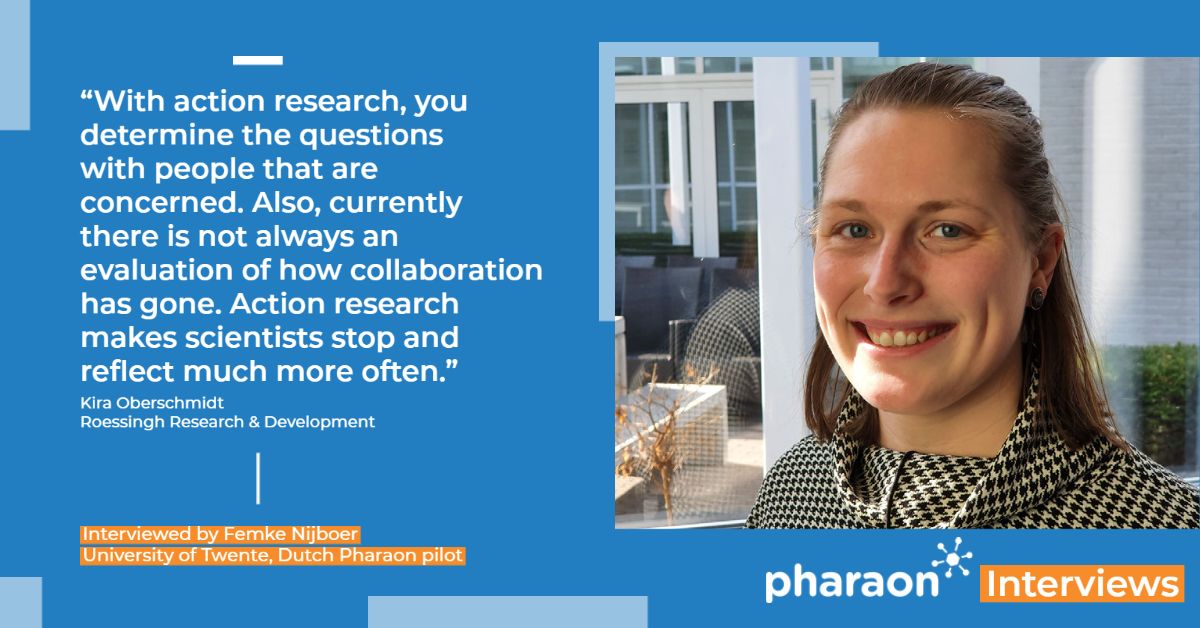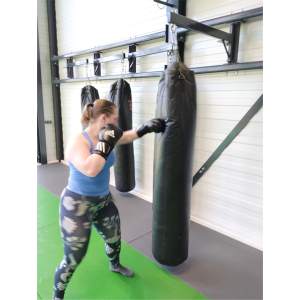
05 May Kira introduces us to action research
In previous interviews with older people that participate in Pharaon, they clearly indicated that older people themselves know very well what is needed. A new generation of scientists realises this all too well and wants to change science. Science must become more accessible and transparent and take place in the middle of society.
Kira Oberschmidt (28) is one such young scientist. Her research is about how to do research. Action research, that is. Our Pharaon researcher Femke from the University of Twente sought Kira out at her employer Roessingh Research & Development to ask her what exactly Action Research was. And what makes her so interested in it.
Femke: Kira, how nice that I get to interview you. I understand that this is the last year of your PhD research, so you’ll probably be interviewed more often. Are you looking forward to it?
Kira: Haha, yes, this feels a bit like the beginning of the end. That sounds very dramatic, but it’s a beautiful thing. I’m in the middle of the final year of research.
Femke: You are working at RRD as a PhD student. Before you explain what that is, can you tell a bit about yourself?
Kira: I am 28 years old and live in Hengelo, the Netherlands. I work at RRD and before coming to work here I studied at the University of Twente. I did two master’s degrees: psychology and health sciences. This is because I was very interested in technology for healthcare. There are opportunities there and there is still so much to do.
Femke: And if I may ask… your name is Oberschmidt?
Kira: I am originally from Germany but am celebrating my 10-year anniversary in the Netherlands this summer.
Femke: We are also having this conversation in Dutch. Perfect Dutch even and without an accent! How did you learn that?
Kira: When I started studying, students still had to take a language course. I had a six-week course in the summer holidays before I started studying.
Femke: And that was sufficient then?
Kira: Sufficient for studying, but it wasn’t at the level I have now. The rest I learned with fellow students, housemates and while playing sports.
Femke: And you did two master’s degrees. Is that normal?
Kira: No, haha, they were very difficult about that at university. I had to fight hard to be allowed to do that. They didn’t really understand why at first, but I was very broadly interested. How people interact with technology, on an individual level, but also how technology enters a system, healthcare. So I found psychology and health sciences a very good fit. Fortunately, it worked out!
Femke: During the master’s, you decided to pursue a PhD. Why did you want to continue in the scientific field?
Kira: When I started studying, I wanted to “just” become a psychologist and treat people, but I changed my mind about that in second year. I liked the graduation project much more than expected. I noticed that I liked writing and research. Also, in my final year I did an internship with a department at the University of Twente and felt very much at home in that world.
Femke: Can you explain what a PhD student is?
Kira: A PhD student is a researcher who is at the beginning. Over the course of about four years, you become increasingly independent. You learn by doing research. You also take courses at the university to train your skills, such as how to find your way in such a large international consortium as the one we work in for the PlusBus study. You are no longer a student. My research will eventually result in a book – we call it a dissertation – it’s a collection of my publications.
Femke: You do research on research. What does that mean?
Kira: Right. For example, I don’t study the impact of a particular technology on health. But I study the parties involved in that research. What role does everyone get? What is the role of scientists? What role do subjects get? A passive role or an active role? Are they allowed to have a say? And if so, how do you make sure everyone has enough self-confidence to express themselves? In short, how do you involve everyone and make the best use of everyone’s expertise.
Femke: And more specifically… you research action research?
Kira: Yes, the idea is that you regularly plan, implement and evaluate something. During action research, we often ask involved parties to reflect on what they are doing. Parties become co-researchers.
Femke: Is that new then? Just a critical question, but I can imagine readers would just call this “common sense”.
Kira: Yes, you would think so. But in science, very often the plan is made by researchers alone. With action research, you determine the questions with people that are concerned. Also, currently there is not always an evaluation of how collaboration has gone. Action research makes scientists stop and reflect much more often.
Femke: How do the study participants see action research reflected in the Dutch Pharaon pilot study?
Kira: In Pharaon, doing action research was quite difficult. In action research, you sometimes leave without knowing the final destination. You find out the research question together. In Pharaon, some things were just predetermined and had to be done across all pilots. For example, some questionnaires were not always appropriate. So in some countries, they added an evaluation of the questionnaires. They asked older people: ‘Are the number of questions ok? Are the questions logical?’
Femke: I recognise that from Dutch study participants. There was a man who had to indicate in the questionnaire what illnesses he had, but when you asked him how he felt he replied; ‘healthy!’. There was a difference in questioning and perception.
Kira: The large scale of our European project made action research more difficult. In smaller studies you can go into without wanting to know exactly where you come out in four years. That kind of research requires researchers to adapt.
Femke: What kind of adaptation?
Kira: The researcher has to let go of things. If there are co-researchers from the target group, you involve them in the research question. Their question might differ from yours. Are you willing to let go of control a bit and partly follow them?
Femke: How nice! It sounds like it takes a lot of mutual trust to get a good outcome. You are now in your final year. Did it work out for you the way you expected?
Kira: I started in January 2020. In March 2020 the Covid pandemic began. So everything became different! I started doing a lot of other things along the way. I got involved in other projects at RRD. For example, I tested another research method.
 Femke: So you followed your own gut? Hoping it would all turn out well?
Femke: So you followed your own gut? Hoping it would all turn out well?
Kira: Yes, I had to adjust my plans. I looked at what was being asked and had faith. There is always an outcome. Not necessarily what you expected but there will be something.
Femke: Our studies are about lifestyle, healthy ageing. What do you do to stay happy and healthy?
Kira: I don’t have a car. I do everything by bike and walking. Nowadays, I also have a smart watch. Sometimes I go running. I am also kickboxing. That helps me clear my head both mentally and physically.
Femke: Thank you for this interview, Kira! The defence of your dissertation will definitely go over well. If not thanks to your expertise, then with the help of your kickboxing skills.

